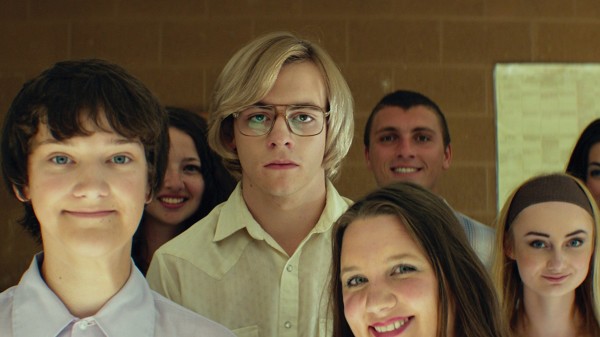
Who was Jeffrey Dahmer before he became a notorious serial killer? My Friend Dahmer offers moody insight into the teenager’s troubled youth.
Let’s bitch it out…
My Friend Dahmer, written and directed by Marc Meyers, is based on a critically acclaimed graphic novel by Dahmer’s real life former classmate Derf Backderf (Alex Wolff in the film). The film doesn’t proclaim to be a tell-all about how the shy, alcoholic loner wound up murdering 17 young men, but like many properties that investigate criminals before they became criminals, My Friend Dahmer has a number of ideas.
In some ways selecting My Friend Dahmer to open the 2017 Toronto After Dark film festival is an unusual choice. It’s not a showy, blood-filled genre entry on par with some of the other festival’s more bombastic picks (For comparison: South Korean revenge film The Villainess opened Fantasia Film Festival in Montreal and Tragedy Girls, a black comedy social media satire, opened this year’s Telluride Horror Show).
Dahmer is a much more traditional, straight forward drama. Evoking inquisitive, melancholy examinations of tragedy like Elephant, Meyers’ film takes its cues from Backderf’s source material by following Jeff Dahmer (Ross Lynch) through his final year at high school in 1978. When the film opens Jeff is already a disturbed young man: he has a fixation with dead animals and taxidermy and his recurring interest in a passing jogger – Vincent Kartheiser’s hunky Dr. Matthews – simultaneously infers Jeff’s sexual interest in men and his burgeoning homicidal tendencies.
Dahmer excels by going beyond a simple examination of Jeff Dahmer. Meyers’ script doesn’t excuse or condone Jeff’s behaviour, but it doesn’t shy away from the broader social circumstances that contributed to his isolation and despair. Anne Heche does a lot with a little as Jeff’s mother Joyce, a woman battling depression, and how negotiating her mental illness occupies much of Jeff’s father Lionel (Dallas Roberts)’s attention. Without a great deal of parental presence, Jeff is frequently left to his own devices, which encourages his worst tendencies. At school Jeff has no friends until a group of boys, including Derf, witness him mimicking the physical symptoms of someone suffering from cerebral palsy. The incident leads the boys (who aren’t malicious but aren’t particularly empathetic, either) to create a Dahmer “fan club” to encourage his disruptive behaviour. The fact that the boys never truly consider him a friend (he’s more of a mascot to be trotted out for jokes and pranks) clearly wears on Jeff.
As our protagonist, Lynch plays Dahmer as a mildly inscrutable figure – he’s prone to violent outbursts when upset, but these always happen when he’s alone in the woods. The script requires Lynch to evoke a variety of emotions without vocalizing them (Dahmer is so quiet that he’s nearly mute, though his large frame, enhanced by weights provided by his father as a strategy to attract girls, makes him an intimidating figure when he skulks down the school hallways). Much has been made about Lynch’s former status as a Disney channel star, but the actor has no difficulty shedding his child-friendly persona for something far more nuanced and adult. It’s a complicated and unsettling performance that hints at a bright career in the future.
Fans of Backderf’s graphic novel will appreciate the care put into the adaptation, even if the scope of film is more constrained that the multi-year span of the novel. Audiences seeking concrete answers about why Dahmer eventually became a monster, however, should manage their expectations accordingly; Meyers (and by extension Backderf) isn’t interested in offering cut and dry answers. Real life is rarely black and white and My Friend Dahmer is better for acknowledging the murky, unsettling moments that add up to make us who we are. Even if who we become is the monster we were taught to fear.
My Friend Dahmer will be released in theatres Friday, Nov 3.